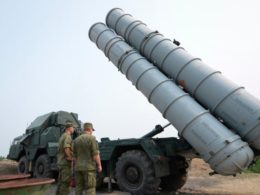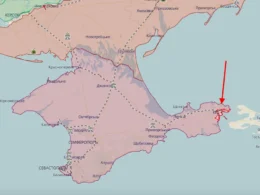If Russia's President Vladimir Putin decides to end the war against Ukraine now, 70% of Russians are ready to support such a decision, but with conditions, according to a poll by Levada Center, a Russian independent, nongovernmental polling and sociological research organization.
The level of support for the Russian armed forces has slightly increased, based on the Levada Center's poll. In October 2023, 45% of Russians supported the actions of the Russian army in Ukraine (41% in September 2023).
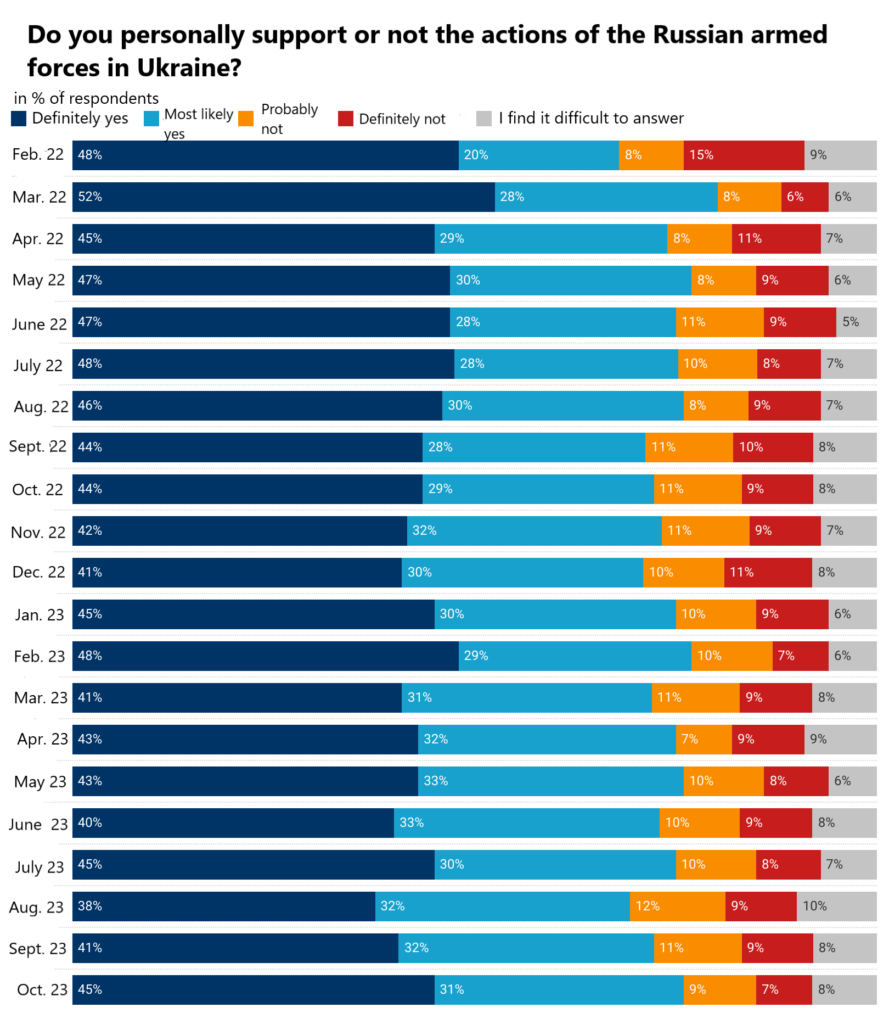
Credit: Levada Center.
Over half of the respondents believe that the Russian invasion of Ukraine is progressing successfully. In October 2023, 50% of Russians believed that the Russian invasion of Ukraine was "rather successful" (49% in July 2023), and 12% of Russians believed the invasion of Ukraine was "very successful" (11% in July 2023). Only 14% of Russians said the invasion was "rather unsuccessful."
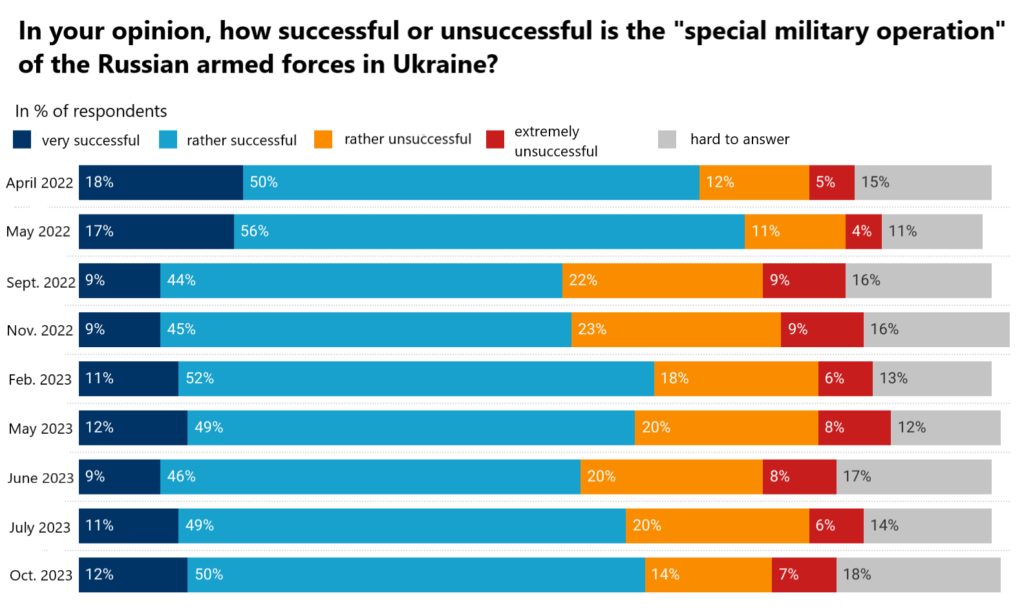
Credit: Levada Center.
At the same time, the number of supporters of peace talks has slightly increased over the last month, according to the Levada Center. According to the poll, 56% of Russian citizens believe the war should be stopped and peace negotiations should begin (51% of respondents in September 2023).
In October 2023, 37% of Russians believed the Russian war against Ukraine should continue (39% in September 2023), according to the poll.
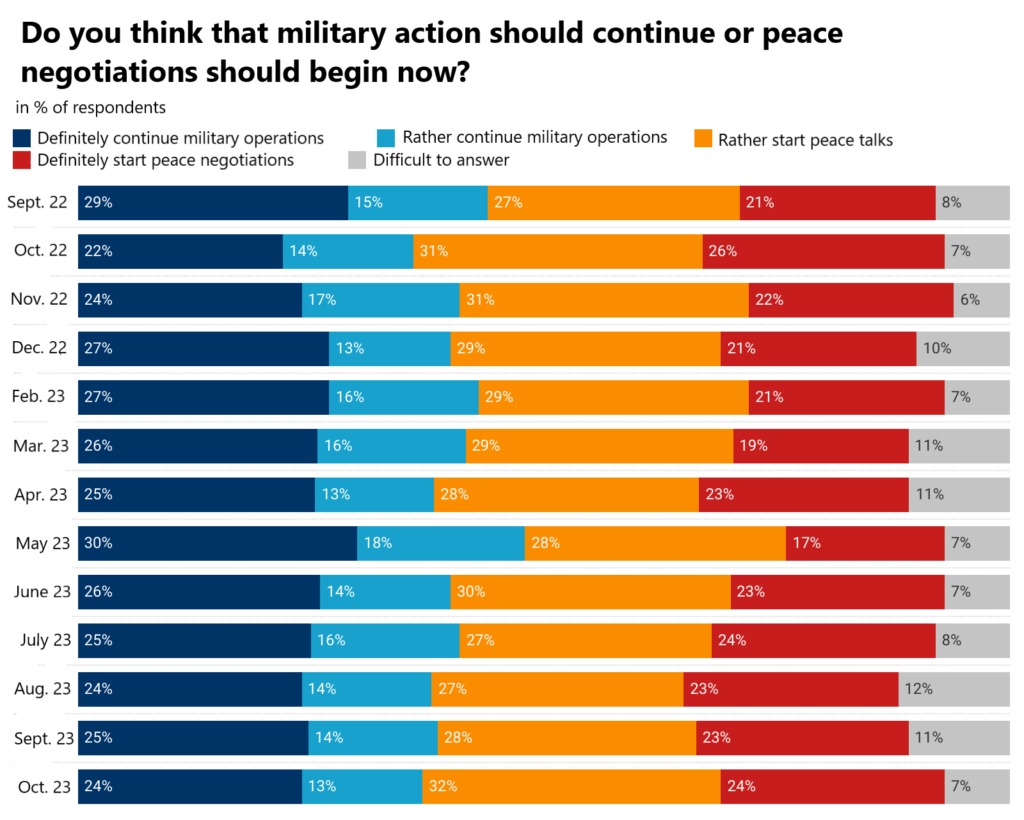
Credit: Levada Center.
Most Russians are sure that Russia's war against Ukraine will last more than a year (46% of respondents).
Answering the question of why Russia began the full-scale invasion of Ukraine, 25% of respondents said Russia had "to protect/free the residents of Donbas/Russian people, help Donbas, protect the Russian language in Ukraine, and stop genocide" against Russian-speaking citizens of Ukraine. 14% of respondents believe that Russia started the war against Ukraine to "eradicate fascism, free the world from fascism, and exterminate Nazism."
“We will kill them all”: Why Russia’s war against Ukraine is genocide
13% of Russians believe that Russia started the war against Ukraine to prevent possible aggression of Ukraine/Europe/West; because "they were the first to start and forced Russia" to act this way; Ukraine started the war, not Russia; Ukraine "hammered Donbas for eight years."
12% of respondents said Russia started the war to secure Russian borders, ensure the safety of the Russian people, protect Russian sovereignty, and demilitarize Ukraine. 10% of respondents said that Russia had to invade Ukraine to "return historical Russian territories."
6% of respondents said Russia started the war to "remove NATO from Russian borders, to prevent Ukraine from joining NATO, and to fight back against the USA. 2% of respondents said Russia started the war against Ukraine to "prevent large scale World War III/protect peace and future."
If the respondents had an opportunity to go back in time and influence the decision on the start of the full-scale Russian invasion of Ukraine, 41% of Russians would have canceled such a decision, while 43% would have supported it (55% of Moscow residents would have supported the invasion of Ukraine).
Most Russians (70% of respondents) are ready to support Putin's decision to end hostilities in Ukraine, but on condition that all occupied territories remain under Russian control.
The myth of “historically Russian Crimea”: colonialism, deconstructed
If Vladimir Putin decided to end the war against Ukraine on the condition of returning the occupied territories to Ukraine, only 34% of Russians would support his decision.
The level of attention to the Russian invasion of Ukraine has not changed for three months, with about half of Russians following the events, according to the Levada Center.
In October 2023, 20% of respondents in Russia said they follow news about Russia's invasion of Ukraine "very closely" (up from 18% in September) and 29% "fairly closely" (up from 30% in September). According to the Levada Center's poll, in October, 35% of Russian respondents followed news about Russia's war against Ukraine without much attention, and 15% did not follow at all.
The survey was conducted on 19-25 October 2023 among 1,607 Russians in 137 settlements in Russia. The research was conducted at home through personal interviews. The statistical error does not exceed 3.4%, according to the Levada Center.
Related:
- Top-10 Russian genocidal quotes about Ukraine
- Satellite images reveal Russian military factories ramping up production
- "Our children are gone": Russian missile strike kills every sixth resident in village
- World looks away as Russia bombs Kherson daily
- Imperialism, chauvinism, expansionism: Russian soldiers’ graffiti in Ukraine shows it’s not just Putin’s genocidal war
- Genocide, assimilation, theft: Kazakh historian reveals Russian colonialism's ruthless playbook


